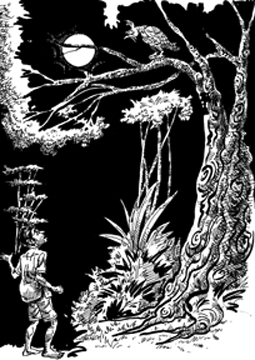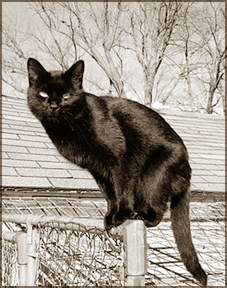
by Amal HEWAVISSENTI
You might have felt your blood run cold on hearing a long drawn
howling of a dog or a wailing cry of a devil bird ("Ulama") which is
assuredly considered an ill omen foreshadowing the death of the eldest
in your household. In Sri Lankan culture in particular, the cry of house
gecko and the magpie's call are the pronounced ill presages suggesting
destruction to someone or miscarriage of one's plans.
 In
Sri Lanka, thousands of varied superstitions exist in relation to human
and animal behaviour and natural phenomena which have traditionally come
down as a part and parcel of culture and folklore. However, a few of
these superstitions are proved to have a scientific basis which the
forerunners of these beliefs have been vaguely aware of but not been
able to explicate in justification of their creations. For instance, a
person, who is in close proximity to death, may radiate some chemical
rays which are perceptible not to human senses, but only to the complete
senses of an animal. When a dog happens to perceive these ominous rays
of its master, it begins to howl in a complex mental perplexion.The
reality underlying the "Ulema's" mysterious cry is that it simply voices
a high pitched sexually appealing call to another female bird - a cry
which sounds ominous to people's ear, but apparently has nothing to do
with funerary circumstances. In
Sri Lanka, thousands of varied superstitions exist in relation to human
and animal behaviour and natural phenomena which have traditionally come
down as a part and parcel of culture and folklore. However, a few of
these superstitions are proved to have a scientific basis which the
forerunners of these beliefs have been vaguely aware of but not been
able to explicate in justification of their creations. For instance, a
person, who is in close proximity to death, may radiate some chemical
rays which are perceptible not to human senses, but only to the complete
senses of an animal. When a dog happens to perceive these ominous rays
of its master, it begins to howl in a complex mental perplexion.The
reality underlying the "Ulema's" mysterious cry is that it simply voices
a high pitched sexually appealing call to another female bird - a cry
which sounds ominous to people's ear, but apparently has nothing to do
with funerary circumstances.
Many irrational beliefs in the supernatural can be traced to the
primeval times when people had no understanding of nature and natural
phenomena. Being surrounded by mysteries, they could not
understand-events in nature such as lightening, rain and eclipses of the
sun, and human events such as birth and death. They believed that unseen
spirits, both good and bad, were at work in the world around them. To
invoke the support of good spirits and keep the evil spirits happy and
content, they invented all types of magical charms and tokens.
Ancient people had a firm conviction in the power of magical charms.
They believed that a wish would come true if it was made while looking
at or touching something that had experienced good fortune or associated
with material wealth. For example, in England, the rabbit's foot became
a good luck charm because people were greatly impressed by the power and
movement of a rabbit's hind legs which came to be viewed as powerful
charms against sinister forces. Other clear cut irrational beliefs
associated with money and wealth are, the presence of beehive near one's
home and dealing with money on January 1st which are thought to promise
a life time of prosperity to a person. In spite of scientific fact and
common sense, a few people today are completely free of superstitious
beliefs as superstitions still influence the overall thoughts and
actions of people throughout the world. People in different countries in
fact, often have their own unique superstitious beliefs and customs. A
lucky charm or superstitious belief may give someone a feeling of
perfect confidence, but such charms and superstitions really have no
potential power beyond what human thinking and actions give them.
Some common superstitions
Breaking a mirror
 Most
people think that shattering a mirror is definitely a portent of seven
years of bad luck and this superstition formed itself long before the
mirrors were known, when people believed that a reflection in a pool of
water was really the soul or "other self" of a person. Most
people think that shattering a mirror is definitely a portent of seven
years of bad luck and this superstition formed itself long before the
mirrors were known, when people believed that a reflection in a pool of
water was really the soul or "other self" of a person.
After the invention of mirrors, breaking one and harming the
reflection in it continued to mean bad luck to the other self because
this other self would be injured if disturbed in any way. Ancient
Romans, for example, believed that a mirror smashed meant seven years of
violent upheaval or mischance and the number seven was chosen because
they thought that life renewed itself in the course of every seven years
and it would take a person that long to recover from any impairment.
The number 13
 The
number 13 has been envisioned as an illstarred number among many
cultures for thousands of years and the Friday the 13th itself is
speculated to be the unlukiest day except for those who were born on the
13th, for whom it is a memorable day in their lives. The
number 13 has been envisioned as an illstarred number among many
cultures for thousands of years and the Friday the 13th itself is
speculated to be the unlukiest day except for those who were born on the
13th, for whom it is a memorable day in their lives.
The superstition about Friday the 13th may have its basis on the
Norwegian Legend about a goddess who was banished for being a depraved
witch. Even today it is believed that each Friday, a day called
"witches' sabbath", twelve witches and the devil met to wreak havoc on
earth.
Black cats
 The
superstition about the hellish devilry that can come alive when a black
cat crosses someone's path goes back to the ancient times where it was
believed that black cats were close associates of witches and warlocks
and eventually transformed themselves into witches themselves. A black
cat coming towards someone could therefore be a witch intent on doing
mischief and the safest thing to do was to avoid the cat. The
superstition about the hellish devilry that can come alive when a black
cat crosses someone's path goes back to the ancient times where it was
believed that black cats were close associates of witches and warlocks
and eventually transformed themselves into witches themselves. A black
cat coming towards someone could therefore be a witch intent on doing
mischief and the safest thing to do was to avoid the cat.
Spilling salt
 Many
irrational beliefs are based on use of salt. Ancient people thought that
salt was mystic or witchy and could perform good or evil because when
they unravelled the ability of salt to preserve food, they believed it
could protect them too. Spilling salt was believed to be a gorewarning
from good spirits that evil was nearby. Since people thought that good
spirits lived on the right side of the body and evil ones on the left,
they used to sprinkle a pinch of salt over the left shoulder to satisfy
evil spirits who were possibly intent on ruination. Many
irrational beliefs are based on use of salt. Ancient people thought that
salt was mystic or witchy and could perform good or evil because when
they unravelled the ability of salt to preserve food, they believed it
could protect them too. Spilling salt was believed to be a gorewarning
from good spirits that evil was nearby. Since people thought that good
spirits lived on the right side of the body and evil ones on the left,
they used to sprinkle a pinch of salt over the left shoulder to satisfy
evil spirits who were possibly intent on ruination.
Opening an umbrella
 This
superstition came in to existence long ago when umbrellas were much
larger than today and most people believe that opening an umbrella
indoors will bring ruination and disappointment. When opened indoors
these large clumsy umbrellas could hurt someone or damage something in
the house. This
superstition came in to existence long ago when umbrellas were much
larger than today and most people believe that opening an umbrella
indoors will bring ruination and disappointment. When opened indoors
these large clumsy umbrellas could hurt someone or damage something in
the house.
Walking under a ladder
 In
some Asian countries, hard criminals were subjected to capital
punishment by hanging them from the seventh rung of a ladder propped
against a large tree. Ancient people held the belief that the death was
contagious and the individual who walked under the ladder was supposed
to be in danger of catching death from the ghost of the hanged. However,
this belief, irrational it may sound, also had a sensible basis because
a ladder can practically collapse, or tools lying on its rungs may fall
and harm someone underneath. The intercultural superstition illustrated
above are just a few of the thousands of beliefs rooted worldwide.
However, one prominent factor related to these beliefs that, they,
though baseless, tend to promote good behaviour in humans rather than
undermining the well being of society. In
some Asian countries, hard criminals were subjected to capital
punishment by hanging them from the seventh rung of a ladder propped
against a large tree. Ancient people held the belief that the death was
contagious and the individual who walked under the ladder was supposed
to be in danger of catching death from the ghost of the hanged. However,
this belief, irrational it may sound, also had a sensible basis because
a ladder can practically collapse, or tools lying on its rungs may fall
and harm someone underneath. The intercultural superstition illustrated
above are just a few of the thousands of beliefs rooted worldwide.
However, one prominent factor related to these beliefs that, they,
though baseless, tend to promote good behaviour in humans rather than
undermining the well being of society. |

